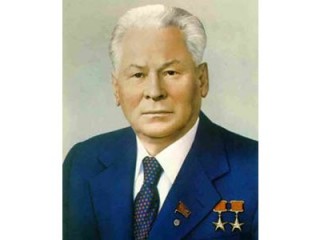
Konstantin Chernenko biography
Date of birth : 1911-09-24
Date of death : 1985-03-10
Birthplace : Bolshaya Tes, Novoselovo District, Krasnoiarsk Territory, Russia
Nationality : Russian
Category : Politics
Last modified : 2011-09-07
Credited as : comunist politician, general secretary,
After many years as a loyal and effective member of the Communist Party, Konstantin Ustinovich Chernenko ruled the Soviet Union as general secretary for 13 months between February 1984 and March 1985.
Born September 24, 1911, into a large and impoverished Siberian peasant family in the village of Bolshaya Tes, Novoselovo District, Krasnoiarsk Territory, Chernenko left home by his own account at age 12 to work as a farm hand. His formal grade and secondary school education may have ended at this time. Although his name is Ukrainian, his official biographers describe him as an ethnic Russian, and it has been suggested that his family at one point migrated from the Ukraine to South Siberia, where they came to consider themselves Russian.
As a teenager Chernenko became associated with the Communist Youth League (Komsomol), often an apprenticeship for future party officials. In 1929-1930, he was named to head the propaganda and agitation department of the Novoselovo District Komsomol committee.
The post was an important one. The year 1929 marked the beginning of forced draft collectivization in Soviet Russia, and a person in Chernenko's position would have played a role in the forceable creation of collective and state farms around Krasnoiarsk, as well as in the expulsion of those considered kulaks (wealthier peasants). In 1930 Chernenko began three years' service with the Red Army on the Chinese border. He became a full member of the party in 1931 and returned after his military service to Krasnoiarsk as a party propagandist, rising rapidly in the regional hierarchy and undoubtedly benefitting from Stalin's bloody purge of older party officials. Around the time of the German invasion in June 1941 he became secretary of the Krasnoiarsk Territory party committee responsible for political education.
Chernenko was apparently a successful local party boss. In 1943 he was selected to attend the Higher School for Party Organizers in Moscow, a stepping stone for promotion. Upon graduation in 1945 he was sent to Penza, where his work again apparently earned him a promotion to Moldavia, where he assumed the difficult task of heading the Moldavian Communist Party Central Committee's Propaganda and Agitation Division. The tasks of economic and ideological reconstruction in this largely Rumanian corner of Soviet Russia were formidable and put Chernenko to the test.
It was here that he developed his close association with Leonid Brezhnev, who headed the Moldavian party from 1950 to 1952 and whom Chernenko served as a loyal and competent aide. Soon after Brezhnev was brought to Moscow in 1956 as a party secretary, Chernenko was summoned as well, assuming a post in the Central Committee's Propaganda Section. In 1960 when Brezhnev became president of the Supreme Soviet, Soviet Russia's leading government position outside the party hierarchy, Chernenko became, in effect, his chief-of-staff. And as Brezhnev came to full power after the death of Khrushchev, Chernenko took on additional responsibilities in various party and state organs. He became a member of the Central Committee in 1971 and was elected a secretary of this all-important body in 1976. From 1978 onwards he also served as a full member of the ruling Politburo. Brezhnev apparently expected Chernenko to succeed him as general secretary and groomed him for this post. In 1979 Chernenko participated in the Vienna arms limitation talks and frequently met with foreign visitors and delegations.
It is still unclear how luri Andropov outmaneuvered Chernenko after Brezhnev's death in 1982, but this is not of great historical importance. Chernenko was known as a moderate and compromiser, a man unwilling or unable to initiate sharp changes in Soviet policy or to offend various groups of Kremlin leaders identified with competing policies or positions. He seemed to accept Andropov's success with good grace and political acumen, establishing a place for himself as party ideologist and chief theorist. With Andropov's illness, his position as successor was all but assured.
An aging and sick man when he was elected to succeed luri Andropov on February 13, 1984, his tenure in this all-powerful position was the briefest in Soviet history—and the least notable. No significant policy initiatives were begun under his direction, and no progress was made in improving chronic Soviet economic problems. No steps were taken to end the war in Afghanistan. When Chernenko died on March 10, 1985, from severe heart disease, Soviet citizens received the news with little apparent distress. Many probably felt conditions in the Soviet Union could begin to improve under new, more vigorous leadership.
Some in the West found it remarkable that a person with as little individual distinction as Chernenko could come, even for a brief period, to occupy one of the most powerful positions in the world. Unlike Andropov, Gorbachev, Romanov, and other of his Politburo colleagues, he never administered a major Soviet party organization or institution on his own. His personal life was also kept from public view. Many in both the former Soviet Union and the West saw his wife, Anna Dmitrievna, and his daughter, Elena Konstantinova, for the first time at his funeral. He was, however, a loyal and effective party aide, and his brief tenure as general secretary at age 72 rewarded his decades of devoted service as a career party politician.
















